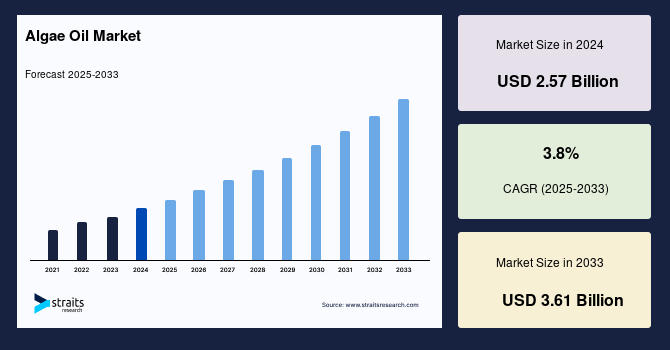Algae Oil Market Size, Share & Trends Analysis Report By Type (Omega-3, Omega-6, Omega-9), By Application (Food and Beverages, Cosmetics and Personal Care, Nutritional Supplements, Biofuels), By Source (Microalgae, Macroalgae), By Form (Liquid, Powder), By Distribution Channel (Online Retail, Supermarkets and Hypermarkets, Specialty Stores, Direct Sales), By End-User (Healthcare, Food and Beverage, Cosmetics and Personal Care, Automotive) and By Region (North America, Europe, APAC, Middle East and Africa, LATAM) Forecasts, 2025-2033
Algae Oil Market Overview
The global algae oil market size was valued at USD 2.57 billion in 2024 and is projected to reach from USD 2.67 billion in 2025 to USD 3.61 billion by 2033, growing at a CAGR of 3.8% during the forecast period (2025-2033). The algae oil market is driven by its increasing use as an anti-ageing agent, as the ageing population rate is increasing at the global level. In addition to this, the proactive approach by market players through strong investments in increasing production capacities directs the positive market flow.
Key Market Indicators
- North America dominated in 2024 with a 42.38% revenue share, driven by key players and government support for algae biofuels.
- Based on source, microalgae dominated the industry in 2024, accounting for a revenue share of 61.44%.
- Based on form, the softgel segment led the market in 2024 with a revenue share of 42.35%.
- Based on end use, the nutraceutical segment was the dominant segment globally in 2024, capturing a revenue share of 29.62%.
- Based on sales channel, the online segment led the market in 2024 with a revenue share of 59.87%.
Market Size & Forecast
- 2024 Market Size: USD 2.57 Billion
- 2033 Projected Market Size: USD 3.61 Billion
- CAGR (2025-2033): 3.8%
- Largest market in 2024: North America
Furthermore, with the rising number of applications, the importance of algae in fuel production is increasing, and accordingly, it is promoting the production rate of fuels. The graph below indicates the algae-based fuel production rate in three case scenarios.
-2022.png)
Source: U.S. Department of Energy
This high amount of fuel production facilitates the utilization of algae and algae-based products such as algae oil, benefiting the market growth.
Algae oil is extracted from algal biomass. The biomass consists of natural oils, proteins, and carbohydrates. Algae can produce oils, 35% of their dry weight. The oil is similar to oil derived from plants and vegetables. As algae oil is a triglyceride, it can be converted to a variety of high-value commodity products, primarily biofuels such as biodiesel, through the same processes used to convert vegetable oils. With these properties, algae oil is applicable across various industries with multiple purposes.
Market Trends
Algae Oil-based EP Additives Enhancing Electric Vehicle Efficiency
New applications of algae oil are being explored in the industrial sector aimed at reducing carbon emissions, reducing water consumption, and energy saving.
- For instance, in December 2023, DIC Corporation developed the world’s first algae oil–based high-performance sulfurized EP additive. This product is expected to be in high demand in the electric vehicle industry
Such industry beneficial additives remarkably gain traction from manufacturers, and the demand for algae oil scales up ultimately to a high level, benefiting the market growth.
Algae Oil-based Product with Multiple Health Outcomes
Algae oil has a strong importance in the healthcare industry with various types of health benefits, covering multiple aspects of diseases. Companies are developing marine algae-based products that offer multiple health outcomes.
- For example, Aker BioMarine launched FloraMarine at Vitafoods 2024. FloraMarine has the highest natural concentration of DHA, offering outcomes for brain health, eye health, as well as maternal and foetal well-being
Such multi-functional products are gaining traction in the market, creating demand for algae oil.
Market Summary
| Market Metric | Details & Data (2024-2033) |
|---|---|
| 2024 Market Valuation | USD 2.57 Billion |
| Estimated 2025 Value | USD 2.67 Billion |
| Projected 2033 Value | USD 3.61 Billion |
| CAGR (2025-2033) | 3.8% |
| Dominant Region | North America |
| Fastest Growing Region | Asia Pacific |
| Key Market Players | DSM-Firmenich, Cellana Inc., Corbion, Algatech LTD, Henry Lamotte Oils |

to learn more about this report Download Free Sample Report
Algae Oil Market Growth Drivers
Continuously Growing Beauty Market: An Indication for Rise in Demand for Algae Oil
Algae oil is one of the crucial components of cosmetics and skin care products, offering anti-inflammatory, anti-wrinkle properties. Reduction of wrinkles is the main purpose of cosmetics and anti-inflammatories for skin care products. The continuous growth of the beauty market signifies the rise in demand for algae oil.
- According to L'Oréal, the beauty market is growing over the years. The graph below indicates an estimated growth over the years

Source: Loreal
This continuous growth every year highlights the rise in use of beauty care products, propelling the demand for algae oil as one of its major components.
Growing Nutraceuticals Industry Contributing To Algae Oil Demand
Algae oil is a major source of omega-3 fatty acids like DHA and EPA, offering a vegan alternative to fish oil. With these contents, algae oil offers nutritional factors for heart health, eye wellness, and brain functioning. The rising demand for nutraceuticals significantly demands algae oil as it is applicable for multiple conditions.
- For example, according to the Press Information Bureau, the government of India, the global nutraceuticals market is estimated to be USD 400 billion
- Additionally, countries such as Italy, Germany, and France dominated the European nutraceutical market in 2022
This highly valued nutraceutical market propels the demand for algae oil, as reflected in market growth.
Market Restraining Factor
High Production Cost & Competition from Alternative Products
Algae oil is sourced from various types of cultured algae. For refining it in a pure form to be applicable across various industries, it needs to be processed, and the refining with the required equipment, such as photobioreactors, costs high. So, ultimately, the final product cost increases. In addition to this, algae oil is a bio-based product, tracking the demand for products. But there are other bio-based and non-bio-based products, such as fish oil, krill oil, and plant-based products, that impose a strong competition for algae oil. These two factors collectively limit the growth of the algae oil market.
Market Opportunity
Government’s Strategic Investments: A Promoting Strategy
Algae are penetrating across various industries with efficient and effective applications. So, the government is stepping in to invest in research and development, presenting future opportunities for market growth.
- For instance, in January 2025, the U.S. Department of Energy (DoE) announced an investment of USD 10 million in research and development focused on algae system cultivation and preprocessing. Algae can provide abundant feedstock sources for affordable, reliable biofuels, bioproducts, and bioenergy that do not compete with existing feedstocks
Such strong initiatives taken by the government through investments significantly take the market towards well-defined growth.
Regional Analysis
The North America region dominated the market with a revenue share of 42.38% in 2024. The growth is attributed to the presence of major market players such as Cellana Inc., Corbion, Algenol, Arizona Algae Products, LLC, Elantria Algae oils, NORSAN, Solutex, and Cargill, Incorporated. In addition to this, the government’s strategic investments in the development of biofuel resources, algae system cultivation are fuelling the market growth.
Countrys Insights
The Algae Oil market is experiencing dynamic growth and diversification across the globe, with each country contributing uniquely to the advancement of this transformative field.
- U.S.- The U.S. government is promoting the development of algae-based biofuels through strategic investments. In November 2024, the U.S. Department of Energy (DoE) announced an investment of USD 20.2 million in projects to advance the development of mixed algae for biofuels and bioproducts
- Canada- The Canadian government is promoting the aquafeed application of algae oil by authorizing approval to manufacturing companies. In March 2024, Veramaris secured Canadian authorization for the inclusion of algae oil in aquafeed. This authorization will serve the global demand through an alternative source of Omega-3 EPA & DHA
- France- France-based companies are developing innovative products by using algae oil. For example, Petit Navire partnered with Algama Foods to launch a new range of nutritional plant-based fish products. This product is developed from wheat and soy combined with algae oil, offering a rich source of omega-3 and protein
- Japan- Companies from Japan make a visionary investment for the upcoming years with respect to algae oil. In July 2025, Euglena Co., Ltd. completed a 15% investment in a biorefinery and revealed plans to develop algae oil, highlighting the future investments in R&D and manufacturing of algae oil
- Mexico- The MexicanGovernment’s plans to utilize algae as a biofuel stimulate algae as an energy source. The government of Mexico is aiming to turn sargassum algae into raw material for sustainable aviation fuel
- Egypt- Algae-based biofuel projects drag the trajectory of the Egyptian market. In May 2022, the Egyptian government announced plans to implement a plot CCS project, where the first phase involved the production of 0.35 million tonnes of algae-based biofuel.
Source Insights
The microalgae segment dominated the market with a revenue share of 61.44% in 2024. The growth is attributed to its cost-effective and more sustainable supply of oil. Microalgae offer an oil content of 35-65% of dry mass, which way higher than compared of macroalgae (1-5%). Due to this high percentage of oil, companies prefer microalgae as a source for algae oil over macroalgae.
Form Insights
The softgel segment dominated the market with a revenue share of 42.35% in 2024. The growth is attributed to its enhanced stability over the shelf-life period, targeted and controlled dosage, and prevention from contamination, offering desired and efficient results.
End Use Insights
The nutraceutical segment dominated the market with a revenue share of 29.62% in 2024. The growth is attributed to high demand from omega-3-deficient patients. As it is a vegan product, it is more preferable as a nutritional product over fish oil. Companies such as NORSAN, Nordic Naturals, and iwi life manufacture algae oil for omega-3-deficient people.
Sales Channel Insights
The online segment dominated the market with a revenue share of 59.87% in 2024. The growth is attributed to the rising penetration of e-commerce platforms offering products such as omega-3 enriched products with fast and convenient delivery. E-commerce platforms such as Amazon are enhancing the market reach by providing broad accessibility to products.

The Global Algae Oil Market is consolidated in nature, owing to the availability of algae cultivation sites and raw material required for the development and manufacturing of algae oil, strategic investments by market players for product development, and increasing production capacity. The top players in the industry are Arizona Algae Products, LLC, Cellana Inc., Corbion, NORSAN, Cargill, Incorporated, and Henry Lamotte Oils.
Corbion: An emerging player in the Algae Oil market
American Ingredients Company and Caravan Products merged to form a bio-based product development company, Corbion. In 2017, Corbion acquired TerraVia Holdings and expanded its product portfolio with innovative and specialty ingredients derived from microalgae. Corbion has a broad product portfolio along with algae-based products. With the presence of manufacturing facilities in the U.S., Thailand, Brazil, the Netherlands, Spain, and Mexico, the company has a strong global distribution network, enabling it to emerge with innovative products.
Recent developments by Corbion
- In August 2025,Corbion BRAIN Biotech collaborated to innovate nature-based ingredient technologies, promoting the development of algae-based products
List of Key and Emerging Players in Algae Oil Market
- DSM-Firmenich
- Cellana Inc.
- Corbion
- Algatech LTD
- Henry Lamotte Oils
- FEMICO
- DIC CORPORATION
- AlgaeCytes
- Algenol
- Arizona Algae Products, LLC
- Elantria Algae oils
- NORSAN
- Solutex
- Cargill, Incorporated
- AAK
- Skretting
- Others

to learn more about this report Download Market Share
Recent Developments
- In June 2025 : Vermaris increased production of algae oil by 61% in 2024.The increase in production of algae oil signifies the market availability of the product to be applicable across multiple industries
- In April 2025 : DIC subsidiaryS. opened a new facility for the cultivation of edible algae. This new facility facilitates the availability of algae for the production of algae oil in the U.S.
- In December 2024 : Nature’s Bounty introduced algae-sourced Omega-3s softgels to support heart, joints, and skin health
Analyst Opinion
The global algae oil market is growing gradually with the rising importance of bio-based products. Major industries such as nutraceuticals, biofuels have shifted to microalgae as a source for the development of products. Accordingly, the major manufacturing companies are strategically investing in production capacities to enhance the production rate. In addition to this, government investments in biofuels are efficiently creating opportunities for the development of algae oil to be utilized as a source for the development of biofuels. This gradual rise in awareness about biocompatible products is pushing the boundaries of market growth.
Report Scope
| Report Metric | Details |
|---|---|
| Market Size in 2024 | USD 2.57 Billion |
| Market Size in 2025 | USD 2.67 Billion |
| Market Size in 2033 | USD 3.61 Billion |
| CAGR | 3.8% (2025-2033) |
| Base Year for Estimation | 2024 |
| Historical Data | 2021-2023 |
| Forecast Period | 2025-2033 |
| Report Coverage | Revenue Forecast, Competitive Landscape, Growth Factors, Environment & Regulatory Landscape and Trends |
| Segments Covered | By Source, By Form, By End Use, By Sales Channel |
| Geographies Covered | North America, Europe, APAC, Middle East and Africa, LATAM |
| Countries Covered | US, Canada, UK, Germany, France, Spain, Italy, Russia, Nordic, Benelux, China, Korea, Japan, India, Australia, Taiwan, South East Asia, UAE, Turkey, Saudi Arabia, South Africa, Egypt, Nigeria, Brazil, Mexico, Argentina, Chile, Colombia |
to learn more about this report Download Free Sample Report
Algae Oil Market Segments
By Source
- Microalgae
- Macroalgae
By Form
- Powder
- Liquid
- Softgels
By End Use
- Food & Beverages
- Cosmetics
- Pharmaceuticals
- Nutraceuticals
- Biofuels
By Sales Channel
- Online
- Offline
By Region
- North America
- Europe
- APAC
- Middle East and Africa
- LATAM
Frequently Asked Questions (FAQs)
Anantika Sharma
Research Practice Lead
Anantika Sharma is a research practice lead with 7+ years of experience in the food & beverage and consumer products sectors. She specializes in analyzing market trends, consumer behavior, and product innovation strategies. Anantika's leadership in research ensures actionable insights that enable brands to thrive in competitive markets. Her expertise bridges data analytics with strategic foresight, empowering stakeholders to make informed, growth-oriented decisions.











































